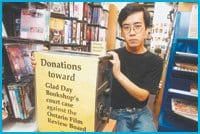
BAD ATTITUDE. Toshiya Kuwabara says today's gay community takes its rights for granted. Credit: Jonathan Lee
April 1982.
Toronto police seize two magazines, The Leatherman and Come Watch, from Glad Day and charge assistant manager Kevin Orr with possession of obscene material for the purpose of resale. He was found guilty but the conviction was overturned on appeal and a new trial never took place. Police couldn’t find Orr to serve a subpoena.
March 1985.
A federal court rules that Customs’ criteria for prohibiting material — “immoral and indecent” — is too vague. Within months, the Mulroney government reacts with the infamous Memorandum D9-1-1, itemizing exactly what kind of material should be seized at the border, including depictions of incest, bestiality and anal penetration. Almost overnight, Customs seizures accelerate. From 1985 to 1991, Glad Day receives 400 to 500 seizure notices. One of the books seized: the 19th-century French classic, Les Fleurs du Mal by Charles Baudelaire.
March 1986.
Customs seizes The Joy Of Gay Sex, a book that has been widely available in Canada for almost a decade. The officials’ chief concern, apparently, is with anal sex. A year later, Judge Bruce Hawkins of the District Court Of Ontario basically tells them they’re nuts. “To write about homosexual practices without dealing with anal intercourse,” he wrote “would be equivalent to writing a history of music and omitting Mozart.” Customs subsequently amends Memorandum D9-1-1 to allow information about anal intercourse provided it is not “prurient in nature.”
December 1986.
Canada Customs seizes more than 500 books and magazines destined for Little Sister’s. Among the 58 titles seized are Jean Genet’s Querelle and four other books available at the Vancouver Public Library. The battle heats up after Customs declares the Advocate newsmagazine inadmissible and the store goes to court. It takes the store two years and $5,000 in legal fees to get the government to admit that it should never have seized the magazines in the first place. By then, unfortunately, the magazines have been burned.
June 1990.
Fed up with years of seizures, Little Sister’s launches a constitutional challenge to Customs’ censorship powers. Together with the BC Civil Liberties Association, the store contends that Customs is discriminating against gay men and lesbians and violating the freedom of expression guaranteed under the Charter Of Rights And Freedoms. The case doesn’t go to trial until October 1994, by which time the store and its supporters have spent about $250,000 in legal fees.
February 1992.
The so-called Butler decision at the Supreme Court Of Canada shifts the onus in obscenity cases from morality to social harm. Now we can watch porn just as long as it’s not violent, degrading or dehumanizing. Among the first victims of the new edict are gay and feminist books. In April, Toronto police charge Glad Day with selling the lesbian magazine Bad Attitude. A judge decides it’s obscene. In July, a judge uses Butler to determine that five shipments seized en route to Glad Day in 1989 are harmful and degrading, and therefore obscene. The shipments included mainstream gay porn mags like Advocate Men, In Touch and Play Guy.
October 1994.
The Little Sister’s case reaches the Supreme Court Of British Columbia. The trial takes a Biblical 40 days to complete and sees testimony by the likes of Pierre Berton, Nino Ricci, Jane Rule, Sarah Schulman and Pat Califia. In January 1996, Justice Kenneth Smith rules that Canada Customs had applied the law in a discriminatory manner against Little Sister’s but that the law itself was constitutional. He doesn’t strike down the legislation. Customs continues to make seizures. The store appeals.
March 2000.
Ten years after it began, the Little Sister’s case reaches the Supreme Court Of Canada. In December, the Supremes agree that Customs has been a little hard on Little Sister’s, targetting it solely because it’s a gay and lesbian bookstore. But they also rule that Customs can continue to screen and censor material at the border, provided it screens equally, without regard to the orientation of the material. The good news is that the burden of proof now lies with Customs. They have to prove that confiscated materials are obscene. Previously it was up to the importer to prove otherwise, a difficult task when the material itself is out of reach.
April 2000.
Glad Day is charged with selling a gay porn video (Descent) that has not been reviewed by the Ontario Film Review Board (OFRB). The store appeals the ruling and four years later, in April 2004, it effectively wins the case. The Ontario Superior Court Of Justice rules that the board’s system of mandatory submission and prior approval violates Canadians’ right to freedom of expression.
July 2001.
Seven months after the landmark Supreme Court ruling chastising customs for targetting Little Sister’s, Customs again seizes items destined for the store. This time it’s two volumes of an anthology of gay adult comics called Meatmen. Little Sister’s goes back to court. While it is preparing for this trial, Customs seizes two collections of gay erotic fiction, Of Slaves And Ropes And Lovers and Of Men, Ropes And Remembrance, both edited by Larry Townsend. These, too, are added to the appeal.
August 2002.
BC government officials try to stop the world premiere screening of Little Sister’s Versus Big Brother, a documentary about the bookstore’s battles by award-winning filmmaker Aerlyn Weissman (Forbidden Love). The same documentary shows up on Pridevision in September 2002 and on CBC Newsworld in January 2004.
September 2003.
Ottawa issues the latest version of the infamous Memorandum D9-1-1, a guide to what’s obscene at the Canadian border. The guide’s handy 10-point list of “obscenity indicators” includes sex with pain, humiliation or urination.
July 2004.
Justice Elizabeth Bennett of the BC Supreme Court awards Little Sister’s advance costs. In February 2005, a Court Of Appeals judge reverses the decision saying the Canadian public has not appointed the store to the role of watchdog over the CBSA.
August 2005.
Ontario’s new Film Classification Act comes into effect. The OFRB can no longer censor scenes but it can ban any film likely to be considered obscene by the courts or the law. More to the point, it remains keeper of the gates. Every film distributed in Ontario must first be reviewed and classified by the OFRB. Apparently, the government didn’t hear the trial judge, who in 2004 inveighed against the board’s invocation of prior restraint.
April 2006.
In a case that could have important implications for anyone fighting the federal government, but especially small businesses and individuals, the Supreme Court Of Canada will hear Little Sister’s case for advance costs. If they win, you may indeed be able to beat city hall.

 Why you can trust Xtra
Why you can trust Xtra


